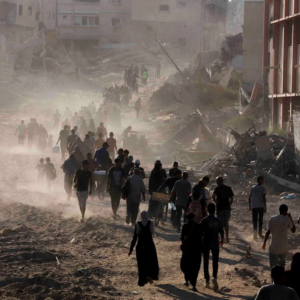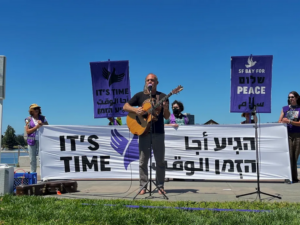War, apartheid, dehumanization: Polls reveal bleak parallels between Palestinians and Israelis

Palestinians returning to the eastern side of Khan Yunis after Israeli forces pulled out from the area in southern Gaza, 30 July 2024
Dahlia Scheindlin reports in Haaretz on 18 September 2024:
Eighty-five percent of Israeli Jews recently agreed, in a new Israeli-Palestinian joint survey, that “the victimization of Jews is the worst compared to other people that suffered from persecution and injustice.” Among Palestinians, 83 percent agreed with the same statement, arguing that Palestinian victimization is the worst compared to all others.
Polls are an imperfect instrument, but the undeniable symmetry of responses to a few questions in this latest poll, conducted between July 18-29 by the Palestinian Center for Policy and Survey Research in Ramallah and the International Program in Conflict Resolution and Mediation at Tel Aviv University, seems to explain everything: the past, present, and likely future of the conflict.
As the poll shows, feelings of victimization fuel justifications for war and violence. Eighty percent of Palestinians believe that their recent years of suffering in Gaza justify October 7, and 84 percent of Israeli Jews believe that October 7 justifies the war. Eighty-nine percent of Palestinians believe the land “very much” belongs to them and 92 percent of Israeli Jews say the land very much belongs to them.
Over 60 percent of Palestinians believe that Israel’s aim in the war in Gaza is to commit genocide – the top response out of four choices, three of them less extreme than that. The second most popular response, selected by over one-quarter of Palestinians (27 percent), was that Israel wants to conquer the land and expel the people. The remainder chose one of two milder answers, but only 2 percent believe that Israel seeks only to defend itself and restore security.
Similarly, two-thirds (66 percent) of Israeli Jews believe that on October 7, Palestinians sought to commit genocide against Jews. Precisely 27 percent believe that Palestinians wanted to conquer the land and expel the people. Only 3 percent believe Palestinians sought to defend themselves.
Expectations for the future follow these dour attitudes; most expect the war to spread. Two-thirds of Palestinians and a similar portion of Israelis (70 percent) think the war will expand to the West Bank. An absolute majority, over half on both sides, think the war will go regional and might even draw in Iran.
The symmetry of trends can seem surprising. Israelis and Palestinians experience vastly different realities of the occupation and this war. But the mind-set of victimhood and justifications for hostility are so similar as to represent almost a mirror image.
Understanding the public, river to sea
The joint Palestinian-Israeli Pulse is a long-running survey that I develop and analyze together with Khalil Shikaki of the Palestinian Center for Policy and Survey Research and our colleagues from Tel Aviv University, Nimrod Rosler and Alon Yakter. Together, we write the questions and analyze the results. The July study is the first such joint survey since December 2022.
The Pulse project is the only study that probes the extensive and deepest questions related to past, present and future of this region, and looks at both populations simultaneously. These are long surveys of over 80 questions, with large and carefully constructed representative samples. I began working on the Pulse project in 2016; but Shikaki’s joint studies go back nearly a quarter century, beginning in 2000 (when I was conducting similar polls, but only on the Israeli side). It was a time when negotiations mattered and, for a few fleeting years, a two-state solution appeared imminent.
Alarming erosion of public support for peace

A rally calling for peace between Israel and the Palestinians, as part of a worldwide event in July 2024
How times have changed. Back then, national leaders relied heavily on this kind of data. Now, no one knows when the major focus of our current study – attitudes toward a two-state solution and core issues in the negotiations – will become relevant for politicians. But the findings are unambiguous about the urgency.
Among Israelis, support for the general concept of “establishing a Palestinian state next to Israel – known as the two-state solution” (as per the question wording) – has tumbled steadily since 2010, from 71 percent at that time to just 31 percent at present. Among Israeli Jews, only 21 percent support the concept of two states, down by over 20 points since the 2020 joint survey, and five points lower than Jewish support this past May, in a TAU Peace Index survey of Israelis.
In fact, based on a similar poll question asked over time, Institute for National Security Studies data shows that the last time support among Jews for a Palestinian state was this low was in 1987.
Among Palestinians as well, just a minority support the concept of two states in this general question, but it’s a larger group – 40 percent. Palestinians actually showed a modest 7-point rise in support following the last joint study in 2022 (and the more recent Palestinian Center for Policy and Survey Research polls of Palestinians). Typically, Gazans showed slightly more support for the two-state solution than West Bank respondents (the gap is larger after respondents heard all the details of an agreement – at that point significantly more Gazans support the detailed two-state package than West Bankers).
If not the two-state solution, then what? Among Palestinians, the answer is nothing, since no other political solution reaches the same 40 percent level of support. In a separate question asking about Palestinian control over all of historic Palestine with just limited rights for Jews (for shorthand, we call this an “unequal one-state” – it can also be described as apartheid), one-third supported the idea. Separately, just one-quarter of Palestinians in the West Bank, Gaza and East Jerusalem supported a single democratic state (also called a binational state).
However, the trends are different this time among Jewish Israelis. Back in 2022, support for two states hit a new low (34 percent among Jews), and for the first time, support for an unequal one-state solution (“annexation of the West Bank/Judea and Samaria, without giving Palestinians full citizenship rights”) outnumbered support for two states, by three percentage points (37 percent). Now, in a dramatic shift, Jewish Israelis’ support for a single unequal state is double the portion who support two states: 42 percent to 21 percent. And just 21 percent of all Israelis (14 percent of Jews) support a single democratic state.
Can support come back?
A few findings mitigate the bleak prospects for peace in the public mind. First, when both sides are faced with a stark choice – regional war on multiple fronts including possibly Iran, or a regional peace, including a two-state solution and Israeli-Arab normalization – a majority of all groups, over 60 percent of Israelis and Palestinians, choose regional peace.
Palestinian-Arab citizens of Israel consistently show high, nearly unwavering support for any question related to peace: from various frameworks for a democratic solution, to specific concessions. They also hold far more forgiving perceptions of both Palestinians in occupied territory and of Israeli Jews. This can’t be taken for granted. Palestinians resent Israeli-Arab normalization, and the majority of both sides oppose two states. But facing the alternative and providing a bigger regional context supporting peace drives the choice home.
Second, a series of incentives we have tested over time, which are designed to make the original two-state prospect more attractive, has considerable effect – in some cases pushing support to a majority for two states.
Third, Palestinian-Arab citizens of Israel consistently show high, nearly unwavering support for any question related to peace: from various frameworks for a democratic solution, to specific concessions. They also hold far more forgiving perceptions of both Palestinians in occupied territory and of Israeli Jews (among Jews and Palestinians, dehumanizing views of the other side hold a sweeping majority).
But ultimately, the negative trends of recent years confirm that people respond to events and developments, and attitudes change accordingly. For example, in recent years prior to the war, support for the lesser-known concept of two states in a confederation arrangement rose, reaching nearly 40 percent among both sides just a few years back, before support for all peaceful political solutions began to drop.
The Israeli left in particular showed an enthusiastic rise to about two-thirds who supported the two-state confederation in 2022. Incentives, as mentioned, also change minds positively. Support for peace has declined for now, but it can rise again when circumstances change.
Why do this depressing research, anyway?
The joint polls represent the only empirical representation of public attitudes among all people of the region, on the critical issues that shape our reality in a bigger way.
It’s not always easy to do this research. Israeli Jews have largely stopped thinking about a two-state solution or the items of negotiations that we try to probe.
Among Palestinians, survey research and sampling are complicated by the war. Recently, the Israel Defense Forces produced a document purporting to show that a Hamas operative had infiltrated Shikaki’s data from Gaza in his March survey (of the Palestinian population only) and inflated positive findings for Hamas. Shikaki conducted a thorough review of the team’s quality control procedures and was unable to find evidence of data tampering; nor did the IDF indicate how it claims the infiltration happened. Shikaki indicated that the Hamas author of the document might well have overstated his influence – and his competence.
Indeed, recent scandals about fraudulent Hamas documents propagated by Israeli political figures raise questions about taking the IDF’s claims at face value.
Despite these challenges, over the years, one insight is worth repeating. As Shikaki wrote in a 2010 book with Prof. Jacob Shamir about the first decade of joint polling: When negotiations became serious, support for violence went down in response. When there was no peace process and people lost hope, the public read reality and supported the use of force at higher rates. As W. H. Auden wrote with chilling precision in his 1940 poem “The Unknown Citizen”:
Our researchers into Public Opinion are content
That he held the proper opinions for the time of year;
When there was peace, he was for peace: when there was war, he went.
Human beings, Israelis and Palestinians too, are no less human today.
This article is reproduced in its entirety
